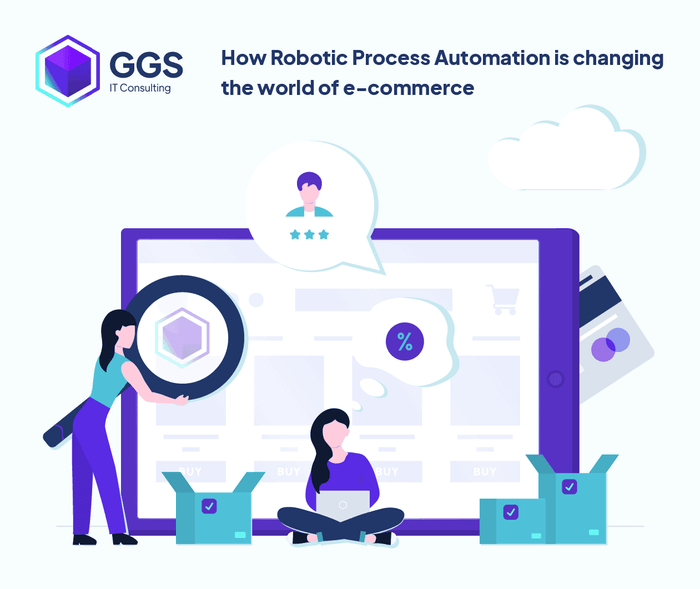
How Robotic Process Automation is changing the world of e-commerce

RPA. These three simple letters are set to have a massive impact on the future of business. If you haven’t already heard of Robotic Process Automation (or RPA) you soon will (and not just in this article). Indeed, RPA is set to revolutionize not just the manufacturing and banking sectors, but also the retail and e-commerce industry. And it is already happening. As more and more CEOs and CIOs catch on to the unlimited potential of this new tech, they are using it to streamline their business operations, improve customer experience and reduce costs. At the same time too, they are freeing up their living, breathing workforce to focus on higher-value work.
To understand the advantages and results you can achieve by implementing robotic process automation in e-commerce applications, we’ll first take a look at exactly why RPA matters now more than ever.
Robotic Process Automation trends
The next decade will bring with it wide-reaching and unstoppable change. Especially within the fields of business and technology. And the major driving force behind this change will be automation. RPA began over two decades ago and is showing no signs of stopping. Indeed, it is anticipated that RPA will transform how we work in the future. Automating routine and repetitive tasks effectively frees up employees’ time so they can focus on more creative and interpretive work. Beyond this, the prediction is that robotic process automation will radically reshape the way the human workforce operates in ways that are hard to conceive of today.
And for those in the e-commerce market, there will come the need to implement RPA or be outpaced by competitors who are. In 2017, global accounting organization Deloitte was already reporting the incredible benefits of adopting RPA technology for businesses, such as improved quality/accuracy, improved productivity, and cost reduction. Indeed, to keep pace with not only change but also their competition, e-commerce businesses will need two things in the rapidly changing economy of the 2020s: the ability to scale up new tech quickly and efficiently as well as the ability to embrace digital transformation with automation at the forefront. If 2021 was the year to begin implementing RPA, 2022 is the year to scale up its implementation to discover exactly what it is capable of. A recent study found that two-thirds of companies will increase their investment in RPA in the near future. This trend is proof positive that businesses globally will continue to leverage robotic process automation to improve workflows and customer experience as well as empower their human workforce to work smarter, not harder.

Did you know that, according to the Office Worker Survey conducted by UiPath, 67% of global office workers feel crushed by doing repetitive tasks? And that they would like to automate many of them? When a company uses RPA to automate such things as writing repetitive e-mails, data input, creating datasets, scheduling calls and meetings, it frees up their in-house talent to work on the bigger picture: driving the business forward.
With all of this in mind let’s take a deep dive into how RPA is revolutionizing the world of e-commerce.
How can Robotic Process Automation benefit e-commerce?
At the heart of e-commerce lies customer service. You might be asking yourself: how does a robot ensure a better customer experience? In a nutshell, automating repetitive, tedious, and time-sapping tasks usually carried out by your human workforce frees them up to better devote their time to providing excellent customer service as well as innovation. To stay ahead of the competition, e-commerce stores must be continually looking to deliver better products, value, and service to the market. Significantly, a recent research project by Forbes, Huffington Post, and Marketing Signals, revealed that 90% of all e-commerce businesses fail within the first three months. This shows how important it is to retain a broad and loyal customer base through great service.
But how does robotic process automation equate to excellent customer service in the e-commerce space? Becoming a customer-centric retailer means focusing on many key processes both before and after a customer purchase is made. RPA can help streamline these processes and allow for a smoother customer experience and reduce unnecessary customer friction.

Ways in which robotic processing automation can improve customer service within the e-commerce industry:
- customer support
- personalization
- order tracking
- inventory management
- processing payments
- customer relationship management (CRM)
- marketing automation
- content creation
- improved analytics.
Customer support
The benefit of RPA upon customer experience is multi-faceted. Not only does it speed up processing times, ensure information is collected and communicated error-free, it also releases your human workforce to deliver the type of personalized customer support modern consumers expect. Indeed, once you have your bots processing all of the tedious, mundane tasks your human staff would normally do, you free them up to work on problem-solving and driving innovation to personalize customer experience.
According to data published by Statista.com, the top two reasons customers would make their next purchase from an e-commerce store relate to how it deals with an unhappy customer.

Managing dissatisfied e-commerce customers can be extremely frustrating, time-consuming, and costly. Proper processing of a returned item has a huge impact not only on customer satisfaction but also on supply chain, statistics, and accounting. When looking at today’s return rates of e-commerce stores, the average rate is at least 30%, compared to around 9% of brick-and-mortar stores. Therefore, it is essential that your business has a returns system in place that is both time and cost-effective. RPA can streamline the returns process significantly as it is essentially made up of multiple repetitive tasks, such as:
- sending a message confirming receipt of the return
- working in tandem with a chatbot to answer customers’ inquiries through the website
- updating the inventory system
- making the payment adjustment or processing refund to the customer
- using robots to inform customers about steps of the refund process
- updating the internal billing system.
With as much importance being given to refund speed, fast shipping, and package tracking, automation is a perfect solution to streamline these customer service processes.
Personalization
Personalization can be a real game-changer to boosting e-commerce conversion rates. The modern online shopper wants their buying experience personalized. If you know where customers are at in their purchase journey, you can personalize their user experience. And RPA offers a powerful way of doing this. Sending a customer a personalized message when they are searching for certain products or following up with automatic notifications about their order shows that your business understands their unique needs and wants.
Order tracking
According to ProShip.com, approximately 80% of customers want the ability to track their orders and receive shipping updates. In the competitive world of e-commerce, it is a necessity to provide accurate, streamlined, and timely shipping information to customers. Companies that do not employ any form of automation will struggle in this respect. On the flip side, RPA automates the usually labor-intensive process of updating customers about their orders, saving a lot of valuable time as well as expenses. Robotic process automation can quickly and accurately extract shipping information from incoming emails, log jobs in your delivery management system, and provide pick-up and delivery times to customers as well as carriers. Put simply: RPA can streamline and expedite order tracking for you and your customers.
Inventory management

E-commerce retailers need to know what their inventory levels are at all times to ensure they have enough product to meet demand. A business using RPA can put its software bots to work monitoring inventory, generating low inventory notifications as well as even reordering stock! With real-time reporting, such businesses can maintain their inventory at optimal levels at all times and also scale-up levels based on patterns of demand. RPA makes it easy and effective for e-commerce retailers to understand their inventory levels and be constantly assessing current needs.
Many e-commerce companies struggle to effectively manage their products and keep inventory levels up to date. It is complicated enough for sellers that keep physical products in the warehouse but can be even more challenging for platforms operating in dropshipping models.
With the use of RPA software e-commerce companies can deal with the most frequently mentioned problems resulting from inaccurate inventory management, such as:
- deadstock
- stock-outs
- controlling lead time variability
- misplaced items
- insufficient tracking.
By automating notifications, data capture, and integration, e-commerce platforms can organize their inventory properly, to maintain high customer satisfaction rates and offset potential profit loss due to inaccurate stock information.
If you would like to know more about ways to automate inventory management read our article "Effective e-commerce inventory management with RPA".
Processing payments
One of, if not the most vital processes an e-commerce business deals with is payment processing. Ensuring transactions happen smoothly and that consumers’ information is kept secure is essential in retaining them as loyal customers. Payment processing involves many sub-processes that all need to be executed perfectly: recording financial information, account keeping, communicating financial transactions, and much more. RPA helps e-commerce companies to streamline this side of their business by uniting all of the payment processes into a seamless, cross-channel operation. And once you can automate billing, accounts payable and receivable, and record price changes accurately and effectively, your business is on its way to minimizing the heavy-lifting of administrivia and maximizing its customer service.
Customer relationship management
If you are running standalone CRM software, now might be a good time to level up your customer relationship management game. By automating all of those boring and routine tasks like manual data entry you’ll not only improve your relationship with customers but also your workforce. A recent survey revealed that 50% of the workers surveyed spend over half their working day performing repetitive tasks. What’s more, the survey also showed that most employees were welcoming of automation. Why tie your sales team up with inputting each new email address into CRM systems when a bot can do this for you in less time and without error (or complaint!)? You can even program your RPA system to generate reports that will provide you with valuable insights into your customer base. And these handy reports can be delivered to your inbox regularly so you never miss a thing. Automating your CRM with RPA can also take the form of auto-replies to expedite your call center processing, customer recognition, as well as using auto-fill to update customer files. When all of this back-end work is taken care of, your employees are free to do what they do best: drive your business forward through great customer service and innovation.
Marketing automation
As marketing rapidly changes from "throwing mud at a wall and seeing what sticks" to an increasingly personalized message, the expertise of human marketers will be more needed than ever. You simply cannot automate the creation of highly engaging content without the imagination of the human mind. Traditional marketing activities are full of mundane, repetitive tasks involving multiple systems that can be easily automated with the use of RPA. This allows e-commerce companies to focus on more creative tasks than just mass mailing or researching competition. Robotic process automation empowers marketing teams to focus on their core competencies, safe in the knowledge that all of the heavy lifting with data is taken care of by RPA. Indeed, a recent survey carried out by UiPath found that over two-thirds of workers globally report automation helps them to be more productive.
Here are some examples of RPA software applications made possible by UiPath:

Robotic process automation software can help employees by executing various manual tasks, such as:
- sending out mass emails
- executing automated web searches (researching competition for example)
- updating customers data
- carrying out lead nurturing programs
- updating information about e-commerce offers
- handling complaints
- automatically adjusting bids in PPC campaigns
- running technical SEO reports, looking for broken links
- gathering and compiling data for reports.
Instead of wasting manual resources on conducting those processes, marketing teams can concentrate their efforts on creating and optimizing creative campaigns that bring real results. If a task can be completed via a set of logical steps, hand it over to RPA. Then let your marketing gurus get back to what they do best: engaging your audience, driving strategy, and being creative.
Content automation

Large e-commerce websites, with hundreds or thousands of products, struggle to keep listings up to date with the critical information customers need to make their purchase decisions. Adding new product listings is a repetitive and time-consuming task that can be quite error-prone. And product information needs to be both highly informative and error-free if it is ever going to help convert your target audience into customers. Did you know that a single spelling error can hurt your sales by more than 40%? So when it comes to e-commerce stores that use a multitude of tools to create and market products, it’s important to get the information right. RPA can perform critical checks of the work of your various teams right across the different stages of content production so that data integrity is ensured.
Importing and exporting data can be repetitive and time-consuming which makes it a good candidate for automation. RPA software is perfect for pulling the information from various predetermined data points and inputting them into the correct fields. What this effectively does is reduce your error rate to zero whilst simultaneously allowing employees to focus on more creative work.
Specific use cases might include:
- automated product categorization
- managing product information in various systems and platforms
- sharing unified product data between teams
- managing content through the product lifecycle
- unified management of digital assets
- easy data import and export.
If you would like to know more about automating content creation using robotic process automation read our article "Automated content creation in e-commerce with RPA".
Improved analytics
Data analytics is the future of business. RPA allows companies to gather powerful data about task completion that can be utilized for goal-setting and scaling-up purposes. Work volumes executed, cycle times, errors and exceptions are just some data points that can be collected and compared. Analyzing such data helps drive improvement and innovation as having the right data at your fingertips is a prerequisite for better decision making. Furthermore, it empowers you to easily identify areas where business processes could be improved to enhance efficiency.
Case Study – Westwing
Founded in 2011, Westwing is a leader in the home and living e-commerce industry. It offers a large range of home decor and furnishings under its own label as well as select third-party brands. It operates out of 11 European countries, including Germany, the Czech Republic, France, and Poland.
Analysis of the company’s processes revealed that a vast majority were conducted manually and that the number of repetitive tasks was not only costing valuable staff hours but was also increasing!
GGS IT Consulting, as a company with experience in both consulting and implementation, was invited to cooperate with Westwing.

The most important automation effects, visible from the first day of the bot's operation, are as follows:
- the process performed by a human (up to several dozen times a day) took between 5-10 minutes. However, the use of robotic process automation shortened the time spent down to only 3 minutes. In addition, the waiting time of the sales team for the implementation of the task has been reduced from several hours to several minutes
- the process can now be carried out 24/7
- RPA implementation has had a positive effect on the process of structuring and arranging data in other areas of the company
- the robot helps drive a very desirable continuous improvement process within the Westwing team. Based on the exceptions reported by the robot, the team receives recommendations on how to improve the input data. And when these are corrected, it further enhances the effectiveness of the robot
- in the future, the implemented robot can be assigned to automate further processes.
Get started
See if you, too, can benefit from hiring one or even a team of virtual employees.
If you would like to discuss how robotic process automation can benefit your e-commerce platform why not reach out to us? We can arrange a free 30-minute consultation to discuss the best way to move your business from analog to digital quickly and safely.
After completing the form, we will arrange a call at a time convenient for you. During the call, our consultant will suggest how to approach the Robotic Process Automation initiative in your Company.
With GGS IT Consulting the future of e-commerce is at your fingertips.
